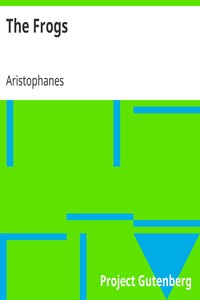The Frogs by Aristophanes
Read now or download (free!)
| Choose how to read this book | Url | Size | ||||
|---|---|---|---|---|---|---|
| Read online (web) | https://www.gutenberg.org/ebooks/7998.html.images | 113 kB | ||||
| EPUB3 (E-readers incl. Send-to-Kindle) | https://www.gutenberg.org/ebooks/7998.epub3.images | 104 kB | ||||
| EPUB (no images, older E-readers) | https://www.gutenberg.org/ebooks/7998.epub.noimages | 105 kB | ||||
| Kindle | https://www.gutenberg.org/ebooks/7998.kf8.images | 168 kB | ||||
| older Kindles | https://www.gutenberg.org/ebooks/7998.kindle.images | 173 kB | ||||
| Plain Text UTF-8 | https://www.gutenberg.org/ebooks/7998.txt.utf-8 | 105 kB | ||||
| Download HTML (zip) | https://www.gutenberg.org/cache/epub/7998/pg7998-h.zip | 101 kB | ||||
| There may be more files related to this item. | ||||||
Similar Books
About this eBook
| Author | Aristophanes, 447? BCE-386? BCE |
|---|---|
| Title | The Frogs |
| Note | Reading ease score: 91.4 (5th grade). Very easy to read. |
| Note | Wikipedia page about this book: https://en.wikipedia.org/wiki/The_Frogs |
| Credits |
Text file produced by Ted Garvin, Marvin A. Hodges, Charles Franks and the Online Distributed Proofreading Team HTML file produced by David Widger |
| Summary | "The Frogs" by Aristophanes is a classic Greek comedy written in the late 5th century BC. The play follows the god Dionysus, who embarks on a journey to the underworld with his slave Xanthias, seeking to bring back the deceased playwright Euripides in hopes of restoring the glory of Greek tragedy, which he believes has declined. It showcases Aristophanes' signature blend of humor, satire, and cultural commentary, particularly targeting literary and political issues of Ancient Greece. The opening of "The Frogs" sets the scene for Dionysus’s comedic journey as he prepares for his descent to Hades. Accompanied by his slave Xanthias, their banter reveals Dionysus's humorous and sometimes cowardly nature. They discuss the task ahead, which involves finding Euripides and weighing the merits of tragic poetry in a contest with Aeschylus, another great playwright. As they travel, they encounter various characters, including Charon, Pluto, and a chorus of frogs, which adds to the absurdity of their quest, highlighting the interplay of wit and satire that defines Aristophanes's work. (This is an automatically generated summary.) |
| Language | English |
| LoC Class | PA: Language and Literatures: Classical Languages and Literature |
| Subject | Comedies |
| Subject | Greek drama (Comedy) -- Translations into English |
| Subject | Voyages to the otherworld -- Drama |
| Subject | Dionysus (Greek deity) -- Drama |
| Subject | Playwriting -- Drama |
| Subject | Dramatists -- Drama |
| Subject | Aristophanes -- Translations into English |
| Category | Text |
| EBook-No. | 7998 |
| Release Date | Apr 1, 2005 |
| Most Recently Updated | May 7, 2013 |
| Copyright Status | Public domain in the USA. |
| Downloads | 584 downloads in the last 30 days. |
| Project Gutenberg eBooks are always free! | |

